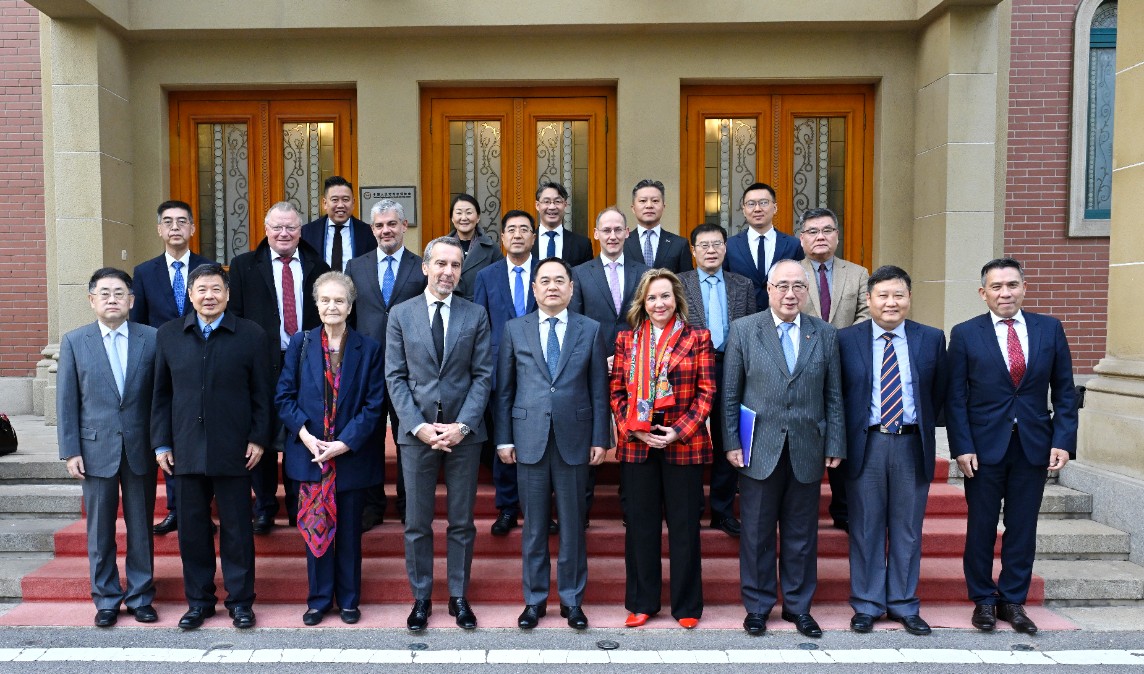On November 8, the Chinese People's Association for Friendship with Foreign Countries (CPAFFC) and the Global Neighbours jointly hosted a roundtable discussion on China-European Union (EU) relations in Beijing under the theme "EU-China Partnership: Shaping the Future Together". Yang Wanming, President of the CPAFFC, Jovanka Porsche, Chairwoman of the Global Neighbours, and Christian Kern, former Chancellor of Austria and President of the Global Neighbours, attended the meeting and delivered speeches. Wu Hongbo, Special Representative of the Chinese Government on European Affairs, presented a keynote speech titled "Jointly Creating a Brighter Future for China-EU Relations".

Those who also attended the event include: Zhu Guangyao, former Chinese Vice Minister of Finance, Jiang Jiang, Vice President of the CPAFFC, Pan Jiang, Director-General of the Department of International Cooperation, National Development and Reform Commission (NDRC), Feng Zhongping, Director of the Institute of European Studies, Chinese Academy of Social Sciences (CASS), Zhou Xiaoyan, Vice President of the China Council for International Investment Promotion, Huang Yiping, Dean of the National School of Development at Peking University, Shi Zhiqin, Executive Director of the Belt and Road Institute of Strategic Studies at Tsinghua University, Cui Hongjian, Professor of the Academy of Regional and Global Governance at Beijing Foreign Studies University, and Wang Tong, Vice President of the Guangzhou Xiaopeng Motors Technology Co., Ltd., Philipp R?sler, former Vice Chancellor and Federal Minister of Economics and Technology of Germany, and Secretary-General of the Global Neighbours, Herta D?ubler-Gmelin, former Federal Minister of Justice of Germany; Marcos Troyjo, former Deputy Minister of Economy of Brazil and former President of the New Development Bank, Gu Xuewu, Director of the Center for Global Studies of the University of Bonn, Eberhard Sandschneider, a renowned scholar on international relations and China expert, Xu Feiyu, Non-Executive Director of Airbus, and Oliver Radtke, Managing Director of the Global Neighbours. They conducted in-depth discussions on the meeting's theme and reached a broad and positive consensus.
In his keynote address, Wu Hongbo highlighted that the world is undergoing profound and major changes and faces significant challenges, including international security, global development, and the coexistence of civilizations. He noted the frequent high-level exchanges between China and the EU, the steady expansion of practical cooperation, and vibrant people-to-people exchanges. However, he also acknowledged existing challenges, including economic and trade frictions and geopolitical issues. Wu emphasized that China views its relationship with the EU from a strategic and long-term perspective and advocates resolving trade disputes through dialogue and consultation. He called for cooperation that transcends differences in ideology and values. Wu underscored the importance of 2025, which will mark the 50th anniversary of diplomatic relations between China and the EU. He stressed that as two major powers, markets, and civilizations, China and the EU have a shared responsibility to act as a steadfast force for world peace, promote common development and continuously promote the integration and progress of human civilization.
The experts and scholars who attended the meeting believed that the development of China-EU relations in the past period has been mixed. On the positive side, bilateral relations have shown a stabilizing momentum. In particular, the frequent high-level exchanges between China and the EU since the beginning of this year reflect the trend of some European countries and the EU to adopt a rational China policy and the complementary and mutually beneficial nature of China-EU cooperation. At the same time, due to the EU's "triptych (rival, partner and competitor)" toward China, "de-risking" and "reducing dependence" on China, trade protectionism and the thinking of attaching political and ideological labels to economic issues and overstretching the concept of security have spread, resulting in twists and turns in China-EU economic and trade relations. Europe's insufficient understanding of China has also led to a decline in mutual trust between the two sides, making it difficult for the two sides to effectively implement the consensus reached earlier at the specific level.
Despite the many challenges facing China-EU relations, the participants agreed that against the backdrop of major changes and profound adjustments in major-country relations and geopolitics, China-EU relations are becoming increasingly important, and the roundtable is timely. China and the EU are interdependent and their interests are inextricably intertwined. The two sides share a common aspiration and vision for practicing multilateralism and addressing global challenges. They have enormous potential for cooperation in the digital economy, green transition, artificial intelligence and its governance. As participants and beneficiaries of globalization, the two sides should help each other succeed, rather than decoupling and disrupting industrial and supply chains. The China-EU relations face more opportunities than challenges in the coming years. Therefore, they should strengthen people-to-people exchanges, enrich China-EU relations with culture, education, youth exchanges and cooperation, and make continuous efforts to improve the public opinion environment for bilateral relations and rebuild popular support for mutual understanding. This will help put China-EU relations back on the right track of mutual respect, objectivity, rationality and pragmatic cooperation, ensure the steady and sustainable growth of the China-EU comprehensive strategic partnership of coordination, and bring more benefits to the two peoples.
In his concluding remarks, Yang Wanming summarized the consensus reached during the discussion, emphasizing mutual trust, peace, cooperation, and exchanges as the takeaways. Yang stressed that rational thinking and concrete actions are essential to implement the consensus reached by both sides. Under the new circumstances, China and the EU should respect each other, maintain open communication, strengthen dialogue, and promote mutually beneficial cooperation. He also called on both sides to uphold multilateralism, respect the authority of the UN and the Security Council, and advocate for a multipolar world that champions international fairness and justice. Yang concluded by expressing the CPAFFC's commitment to deepening exchanges and cooperation with the Global Neighbours and their European insightful people to contribute to the growth of China-EU relations and global peace and stability.
Founded in 2022 and headquartered in Vienna, the Global Neighbours aims to promote dialogue and cooperation between the EU and China.


